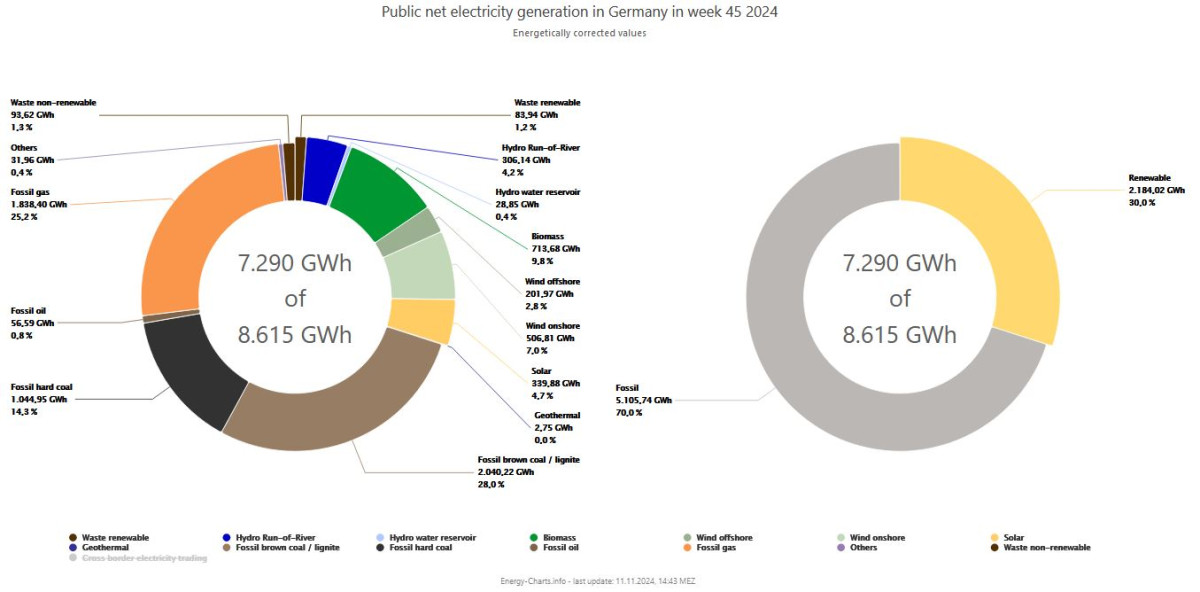Prolonged ‘Dunkelflaute’ shrinks Germany’s renewables output in early November
Early November has brought a prolonged period of little wind and sunshine in Germany and many other parts of Europe, bringing down renewable power generation and leading to a spike in electricity prices and the use of fossil fuels. A so-called ‘Dunkelflaute’ (dark doldrums) with minimal output by solar panels and wind turbines is not uncommon at this time of the year and does not pose a risk of blackouts to Germany’s power system, researcher Bruno Burger of institute Fraunhofer ISE told public broadcaster WDR. “We’ve got sufficient [backup] capacity for this,” Burger said.
Data by Fraunhofer ISE showed that renewables contributed 30 percent to public electricity generation, while fossil fuels covered the remaining 70 percent between in the week between 4 and 10 November.
The share of electricity from weather-dependent wind and solar energy in the German power mix keeps growing, and periods of little sunshine and wind must be considered when managing the grid. An analysis by Germany’s Meteorological Service (DWD) on weather-related risks to renewable power output in 2018 found that there are on average two cases throughout the year when weather conditions reduce renewable power output from solar and wind power to less than ten percent of the nominal output for a duration of 48 hours.
If viewed in an integrated European network, the incidence dropped to 0.2 cases, the DWD found, stressing the importance of managing renewable power production in a cross-border context. However, the DWD at the time added that longer periods of suppressed renewables output in Germany cannot be ruled out, which is why back-up capacity and more renewables were needed to stabilise the grid in these situations.
Wholesale electricity prices rise
While batteries could provide additional capacity especially during the summer, fossil fuel plants would close the gap in renewable electricity production during Dunkelflaute periods in winter, which due to the merit-order effect mean costly gas-fired power plants set the electricity price. In future, gas should be replaced with green hydrogen-powered plants during these periods to guarantee greenhouse gas neutral power generation, Burger said.
Tobias Federico, head of consulting company Energy Brainpool, told Handelsblatt that Germany at times earlier this month had “produced the maximum amount of electricity that can be produced without renewables.” This led to power prices of 800 euros per megawatt hour for several hours, more than ten times more than the average price in recent months, Federico said. However, researcher Burger said that this was balanced by periods of extremely low or negative prices during times of high renewable power output. Most customers would not be affected by the short-term price oscillations on the power market anyways, Burger added.
New clean backup capacity
The German government coalition of Olaf Scholz before its collapse was about to decide on a law package regulating the construction of new gas-fired power plants that can later be converted to run on hydrogen, the Power Plant Security Act. These plants are regarded as indispensable for ensuring a smooth implementation of the country's coal phase-out, which is scheduled to end no later than 2038. Energy industry representatives and policymakers have said that an earlier exit from coal is not feasible if there is no decision on where and when the plants are going to be built by 2025. It is unclear whether the necessary legislation can still be decided before snap elections lead to a new parliament.


